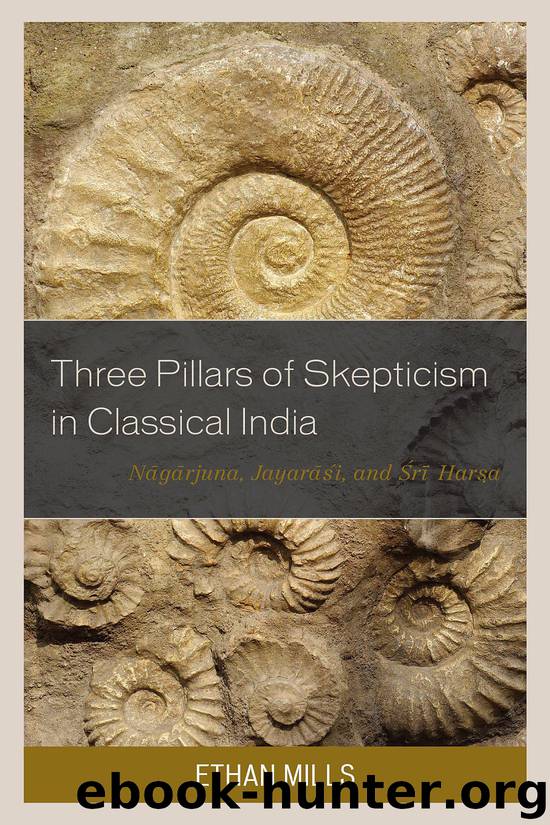Three Pillars of Skepticism in Classical India by Ethan Mills

Author:Ethan Mills
Language: eng
Format: azw3, mobi, epub
ISBN: 9781498555708
Publisher: Lexington Books, a division of Rowman & Littlefield Publishers, Inc.
Published: 2019-02-07T16:02:59.057736+00:00
Chapter 5
Jayarāśi and the Delightful Destruction of Buddhist Epistemology
And when this (i.e., there being two pramāṇas) is not possible, saying “There are only two pramāṇas”is the gesticulation of a fool.
—Jayarāśi, Tattvopaplavasiṃha 3.3a
In the previous chapter I argued that Jayarāśi should be understood as the second of the three pillars of classical Indian skepticism about philosophy. While his skepticism draws on many of the same elements as Nāgārjuna’s, especially the prasaṅga form of argument, he should be seen as most strongly developing the materialist and Sañjayan elements of early Indian skepticism as discussed in chapter 1. Jayarāśi’s skepticism embodies a kind of contextualism: in the context of epistemology, epistemological theories self-destruct, while in the context of everyday life, there is no need for epistemology.
This chapter will show some examples of how Jayarāśi engages in this philosophical destruction. The thesis of this chapter is that applying the general interpretive framework of the previous chapter to Jayarāśi’s specific arguments against the epistemological theories of the Buddhist philosophers Dignāga and Dharmakīrti further demonstrates and exemplifies Jayarāśi’s membership in the tradition of skepticism about philosophy. I conceptualize the specific target of Jayarāśi’s critique in terms of what contemporary epistemologist Michael Williams calls “epistemological realism,” or the idea that there are such things as structures of human knowledge about which epistemologists can theorize. After showing that Dignāga (c. 480–540 CE) and Dharmakīrti (c. 600–660 CE) do in fact endorse this sort of realism (even if they don’t endorse other types of realism), I give a detailed analysis of two of Jayarāśi’s arguments from Tattvopaplavasiṃha (TUS), chapter three: the Non-Establishment of Difference Argument, which ties to show that the Buddhists cannot maintain a difference between perception and inference, and the Impossibility of Considering Duality Argument, which shows that, if the Buddhist theory that there are two mutually incompatible means of knowledge were true, one could never establish that this theory is true. I end with reflections on how these particular arguments fit within Jayarāśi’s larger project of skepticism about philosophy, which makes him quite different than contemporary epistemological skeptics.
5.1 Jayarāśi’s Denial of Epistemological Realism
Recall that in the introduction to the TUS, Jayarāśi presents an argument that acts as a template for the text to come.
The establishment of the means of knowledge (pramāṇas) is based on a true definition. And the establishment of the objects of knowledge (prameyas) is based on the means of knowledge. When that [true definition] does not exist, then how could those two (i.e., the means and the object of knowledge) be the subject of everyday practice toward existing things? (TUS 0.3)1
The purpose of the TUS is to show that the definitions of pramāṇas cannot be established, which in turn demonstrates that neither the pramāṇas nor the prameyas can be established. Jayarāśi’s goal, as he explains at the end of the text, is to rid us of the need to do philosophy so that we can better enjoy our lives, a sentiment I have argued is fully in line with his status as a Cārvāka skeptic.
Download
Three Pillars of Skepticism in Classical India by Ethan Mills.mobi
Three Pillars of Skepticism in Classical India by Ethan Mills.epub
This site does not store any files on its server. We only index and link to content provided by other sites. Please contact the content providers to delete copyright contents if any and email us, we'll remove relevant links or contents immediately.
4 3 2 1: A Novel by Paul Auster(12359)
The handmaid's tale by Margaret Atwood(7736)
Giovanni's Room by James Baldwin(7308)
Asking the Right Questions: A Guide to Critical Thinking by M. Neil Browne & Stuart M. Keeley(5745)
Big Magic: Creative Living Beyond Fear by Elizabeth Gilbert(5731)
Ego Is the Enemy by Ryan Holiday(5400)
The Body: A Guide for Occupants by Bill Bryson(5067)
On Writing A Memoir of the Craft by Stephen King(4923)
Ken Follett - World without end by Ken Follett(4711)
Adulting by Kelly Williams Brown(4557)
Bluets by Maggie Nelson(4539)
Eat That Frog! by Brian Tracy(4505)
Guilty Pleasures by Laurell K Hamilton(4430)
The Poetry of Pablo Neruda by Pablo Neruda(4083)
Alive: The Story of the Andes Survivors by Piers Paul Read(4013)
White Noise - A Novel by Don DeLillo(3997)
Fingerprints of the Gods by Graham Hancock(3981)
The Book of Joy by Dalai Lama(3964)
The Bookshop by Penelope Fitzgerald(3830)
